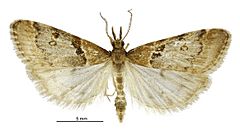Scoparia fimbriata facts for kids
Quick facts for kids Scoparia fimbriata |
|
|---|---|
 |
|
| Male | |
| Scientific classification | |
| Kingdom: | |
| Phylum: | |
| Class: | |
| Order: | |
| Family: | |
| Genus: |
Scoparia
|
| Species: |
S. fimbriata
|
| Binomial name | |
| Scoparia fimbriata Philpott, 1917
|
|
Scoparia fimbriata is a type of moth that belongs to the Crambidae family. This special moth is only found in New Zealand. This means it is endemic to that country.
Contents
About the Scoparia fimbriata Moth
Who Discovered This Moth?
A scientist named Alfred Philpott first described this moth in 1917. When a scientist "describes" a species, it means they officially name it and write down its features.
Its Scientific Name
Scientists are still learning about this moth. They are not completely sure if it fits perfectly into the Scoparia group of moths. Because of this, you might sometimes see its name written as Scoparia (s.l.) fimbriata. The "s.l." part means "in the broad sense," showing that its exact place in the family tree is still being studied.
What Does the Scoparia fimbriata Moth Look Like?
This moth is quite small. Its wingspan is about 20 mm, which is about the width of a small coin.
Wings and Colors
- Forewings: The front wings are a light brownish-yellow color. They are a bit darker near the moth's body.
- The first line on the wing is whitish. It has a dark brownish-black edge behind it.
- The second line is pale. It has a dark brownish-black edge in front of it.
- Hindwings: The back wings are a grayish-yellow color.
- There is a small, crescent-shaped mark called a lunule on the hindwings.
- There is also a line near the edge of the wing, called the subterminal line. Both the lunule and this line are a dusky, brownish-gray color, which scientists call fuscous.
When Can You See Them?
Adult Scoparia fimbriata moths have been seen flying around in December and January.

